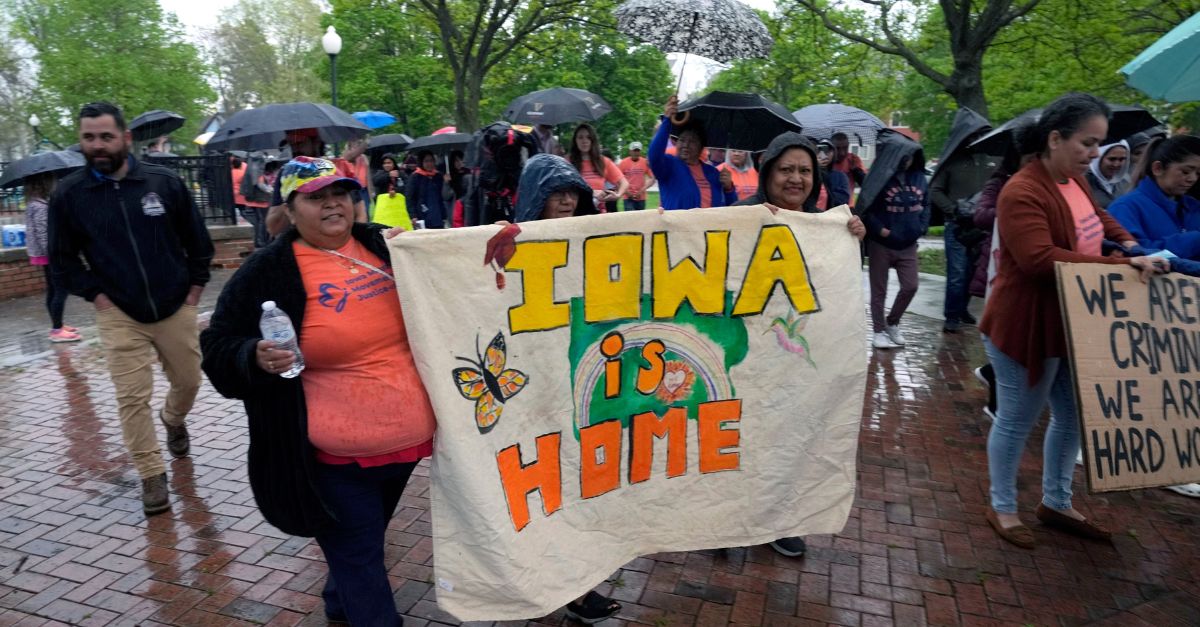
People march during an Iowa Movement for Migrant Justice rally and march, Wednesday, May 1, 2024, in Des Moines, Iowa. (AP Photo/Charlie Neibergall, File).
Just weeks before the law was set to go into effect, a federal judge blocked Iowa’s attempt to create its own immigration policy Monday and ruled that the legislation may have satisfied political appetites, but ran afoul of the Constitution.
Iowa Gov. Kim Reynolds, a Republican, signed Senate File 2340 into effect in April 2024 which made it a state crime to enter Iowa after being deported or denied entry into the United States. Under the new legislation, an Iowa state court judge would be permitted to issue a written order “discharg[ing] the person and requir[ing] the person to return to the foreign nation from which the person entered or attempted to enter[.]”
Des Moines-based advocacy group Iowa Migrant Movement for Justice (“Iowa MMJ”) and a number of its members challenged the statute in court.
U.S. District Judge Stephen Locher, a Joe Biden appointee, issued a preliminary injunction against Senate File 2340 Monday. In a 25-page opinion, Locher reasoned that the federal government is likely to succeed on the merits of the case because federal immigration law preempts the Iowa statute. Under the doctrine of preemption, federal law supersedes conflicting state laws.
Locher found that Iowa’s law differed from and thereby conflicts with federal immigration law in that the Iowa statute lacks a defense for lawful permanent residents.
“As a matter of politics, the new legislation might be defensible,” Locher wrote. “As a matter of constitutional law, it is not.”
The judge characterized Iowa’s lawmaking as an effort borne of dissatisfaction with the Biden administration’s policies.
“Dissatisfied with how the United States Government is handling immigration, the Iowa Legislature decided to take matters into its own hands by enacting new legislation (known as Senate File 2340),” he wrote.
Locher also noted the obvious connection between Iowa’s statute and Texas S.B. 4, the Lone Star State’s attempt to similarly create its own penalties for illegal border crossings.
The U.S. Supreme Court ruled 6-3 in March to allow Texas S.B. 4 to go into effect while the battle over its underlying legality plays out in court. The law authorizes Texas law enforcement to arrest anyone suspected of illegal border crossing and charge them with crimes ranging from misdemeanors to felonies, then to prosecute and punish with jail time or returning them to Mexico. It is part of Republican Gov. Greg Abbott’s hard-line anti-immigration “Operation Lone Star,” which has been blamed for contributing to the death of a migrant woman and two children who drowned when Texas authorities prevented federal Border Patrol agents from rendering aid.
Locher explained that some of the concerns at play over Iowa’s law are substantially similar to those over S.B. 4 — namely the impact a state-made immigration law could have on international relations. The Mexican government issued a statement on Nov. 15 in which it said it “categorically rejects any measure that allows state or local authorities to detain and return Mexican or foreign nationals to Mexican territory.”
Locher also pointed to a 2012 Supreme Court decision that directly relates to Iowa’s legal maneuvering.
In 2012, the Supreme Court ruled 5-3 to strike down Arizona S.B. 1070, which would have allowed local law enforcement to arrest people on “reasonable suspicion” of illegal border crossing. The case also turned on the issue of federal preemption, and as Justice Anthony Kennedy wrote at the time, “Arizona may have understandable frustrations with the problems caused by illegal immigration while that process continues, but the State may not pursue policies that undermine federal law.”
Kennedy’s decision was joined by Chief Justice John Roberts and Justices Ruth Bader Ginsburg, Stephen Breyer, and Sonia Sotomayor — only two of whom are still on the Court. Justices Antonin Scalia, Clarence Thomas, and Samuel Alito each penned a solo dissent at the time.
The Court’s makeup has changed substantially since 2012. In last year’s ruling that allowed Texas’s immigration statute to go into effect, Sotomayor chastised six of her fellow justices for inviting “chaos and crisis” with their “unreasoned” decision.
Reynolds reacted to Locher’s ruling in a statement as follows:
With this injunction states are left defenseless to the ongoing crisis at our southern border. Plainly, the Biden administration is failing to do their job and enforce federal immigration laws allowing millions to enter and reenter without any consequence or delay. I signed this bill into law to protect Iowans and our communities from the results of this border crisis: rising crime, overdose deaths, and human trafficking. I support Attorney General Bird in appealing this decision.
“Iowa cannot disregard the U.S. Constitution and settled Supreme Court precedent,” Brian M. Boynton, the head of the Civil Division of the Justice Department, said in a statement when the lawsuit was filed. “We have brought this action to ensure that Iowa adheres to the framework adopted by Congress and the Constitution for regulation of immigration.”
Emma Winger, deputy legal director at the American Immigration Council, praised Locher’s decision to block what she called a “cruel and blatantly unconstitutional law.”
“Sadly, we are still seeing copycat laws and proposed measures that would cause irreparable harm for immigrant families, including in Arizona, Texas, and Oklahoma,” Winger said. “These types of laws create absolute chaos and human suffering and have no place in our legal system.”
Rita Bettis Austen, ACLU of Iowa legal director, called Iowa’s statute “among the worst anti-immigrant legislation in Iowa’s history,” and said it threatened to expose individuals including lawful immigrants to serious harm. Austen noted that those charged with enforcing the law oppose it as well.
“Local law enforcement in Iowa have spoken up to say that they don’t want this duty, given the significant ways that such enforcement would erode the ability of local law enforcement to protect public safety,” Austen said.
Locher’s decision Monday means the Iowa statute is blocked from going into effect on its planned start date of July 1, 2024. However, the preliminary injunction could still be overturned by the U.S. Court of Appeals for the Eighth Circuit should Iowa wage a successful appeal.
You can read the full ruling here.
Have a tip we should know? [email protected]









